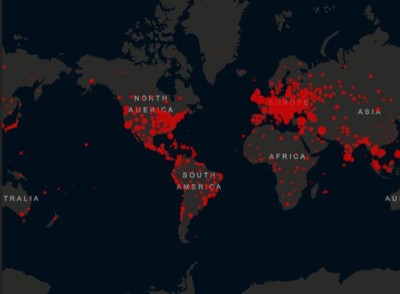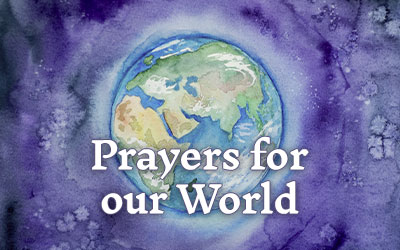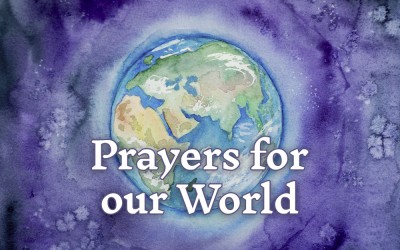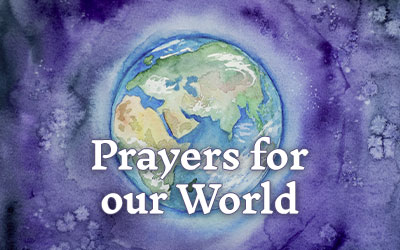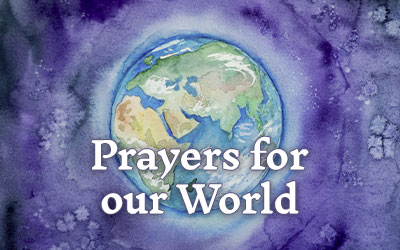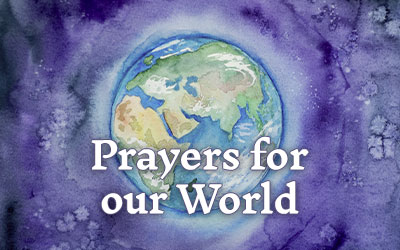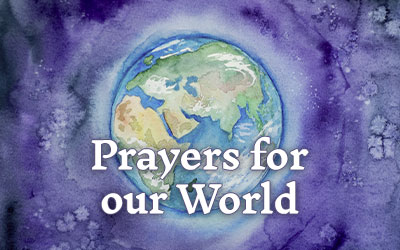I believe one of the great storylines of the Scriptures is this: The Father giving his Son a bride. She would be an eternal companion, an equally yoked partner in love, who would be at his side to reign and rule with him forever!
The Bible starts with a wedding and ends with a wedding!
Ephesians 5:31-32 (NIV), “For this reason a man will leave his father and mother and be united to his wife, and the two will become one flesh.” This is a profound mystery—but I am talking about Christ and the church.”
At the beginning God created them male and female, as a living picture of the covenantal relationship that he desired to have with the human race. Just as a man is called to leave his father and mother and cleave to his wife, Jesus left his Father in heaven and took on human flesh to be forever joined to his bride, the church! As the Father put the first Adam to sleep and brought forth a woman out of his side, so Jesus was put to death. Out of the side wound of the Lamb, the second Adam, a bride was brought forth, united with him in his death and resurrection.
The marriage would be fully consummated at the end of the age, the marriage supper of the Lamb!
Revelation 19:6-7, “Let us rejoice and be glad and give him glory! For the wedding of the Lamb has come, and his bride has made herself ready. Fine linen, bright and clean, was given her to wear.” (Fine linen stands for the righteous acts of the saints.)
In John 17:24-25, just hours before the cross, Jesus lifts his eyes to his Father in prayer and declares his most holy intentions.
“Father, I desire that they also whom you gave me may be with me where I am to see my Glory that you have given me!” (John 17:24).
What do you give a Son that has everything? Jesus strikes at the heart of our greatest longing to know that we are desired and loved by God. Jesus was telling the Father that He desires us to be near Him, not at a distance, but close like a bridegroom and a bride. Our relationship with Jesus goes beyond contractual agreement and faithful obedience. It is to be typified by fervent, ardent love and longing like a bridegroom and a bride have for one another. We are the object of his affections. He longs for a bridal partner not a mere subject in His kingdom. The covenant from heaven’s perspective between God and man is not defined as a service agreement but as a marriage covenant.
We love a king who will not sell out his people for wealth and power but who will humbly serve his people even unto death. We love a husband who fights for the heart, honor, and nobility of his bride, even to the point of death.
Many times, we push him away, but the statement from Jesus on the cross is, “You’re the one I desire.”
In Jesus we have an unwavering King and companion who will give up His life for love. We are the one creature made in the image of God for God, created to be an eternal companion and co-heir with Christ forever. Even now, Jesus maintains a resurrected human body forever. He has forever joined himself to us in love!
The Father and Son are in agreement. The Father wants to give his Son a bride and the Son desires to have a bride, an eternal companion and voluntary lover! She would be in full partnership with his leadership, adorned with His beauty, and seated with him in heavenly places!
I think it is fascinating that Jesus’ first recorded miracle was at a wedding feast in Cana, John 2, where Jesus turns water into wine. In this story something embarrassing has happened, they have run out of wine. It is the responsibility of the bridegroom to provide the wine for the wedding feast. Mary the mother of Jesus says to Jesus, ‘they have no wine, and Jesus says, ‘what does that have to do with us, my hour has not yet come?’ Why does he say that? He is referencing the fast that He as ‘The Bridegroom’ is responsible for providing the wine for the ultimate wedding feast, which is yet to come. He says, ‘My hour is not yet come.’ He is speaking of the hour when his
blood will be poured out in order to establish the new covenant. Nonetheless, He provides the wine, filling up 6 water jars changing the water to wine. He saved the best wine for last! These 6 water pots were for ritual cleansing, and they are now filled with a super abundance of wine, approx. 120-180 gallons! This a prophetic picture that the way forward in cleansing in order to enter into covenant, is through wine, through the wine of the blood of Jesus.
Jesus specifically said, when he handed them the wine at the last supper, a rehearsal of the covenant meal, ‘this is the new covenant in my blood.’ The most valuable currency in the universe is the blood of Jesus that was shed for us to enter into a covenant relationship with God the Father.
On the night before the cross, Jesus had gathered his disciples in the Upper Room. Jesus had been preparing his disciples for his coming death. He now speaks to them a tender word of promise and encouragement,
John 14:1-3, “Do not let your hearts be troubled. Trust in God; trust also in me. In my Father’s house are many rooms; if it were not so, I would have told you. I am going there to prepare a place for you. And if I go and prepare a place for you, I will come back and take you to be with me that you also may be where I am.”
I believe the last supper is a cultural picture of a betrothal ceremony. Betrothal is the first step in marriage, the beginning of covenant. Jesus was drawing from Jewish marriage customs. The Jewish understanding of betrothal has always been much stronger than our modern day understanding of engagement. The betrothal was a binding agreement that would literally need a certificate of divorce to annul the contract (Deut. 24:1-4). The Hebrew word for betrothal, eyrusin, means sanctification, or the setting apart of an individual. It clearly defines the purpose of this period as a time in which a couple would consecrate themselves to prepare to enter into the covenant of marriage.
Let’s look at a few of these Jewish customs to understand the context of several Scriptures related to this betrothal ceremony!
 1. Jewish marriages were typically arranged. The Father would choose a bride for his Son.
1. Jewish marriages were typically arranged. The Father would choose a bride for his Son.
Ephesians 1:4 (NIV), “For he chose us in him before the creation of the world to be holy and blameless in his sight.”
2. The Father and son would leave their home and travel to the girl’s home for the purpose of obtaining a wife through marriage covenant called a ‘katubah.’
Genesis 2:24 (NIV), “For this reason a man will leave his father and mother and be united to his wife, and they will become one flesh.”
3. The Bridal price was established. They would meet with the Father of the chosen bride and negotiate the bridal price called the ‘mohar.’ The price was always a reflection of the value that the man had placed on his soon to be bride.
Deuteronomy 7:6 (NKJV), “For you are a holy people to the Lord your God; the Lord your God has chosen you to be a people for Himself, a special treasure above all the peoples on the face of the earth.
4. The Betrothal date was se The Father and son would leave and the son returns to his home to sell whatever needs to be sold for the bride’s price (mohar)
Matthew 13:44-46 (NIV), “The kingdom of heaven is like treasure hidden in a field. When a man found it, he hid it again, and then in his joy went and sold all he had and bought that field. “Again, the kingdom of heaven is like a merchant looking for fine pearls. When he found one of great value, he went away and sold everything he had and bought it.”
2 Corinthians 8:9 (NIV), “For you know the grace of our Lord Jesus Christ, that though he was rich, yet for your sakes he became poor, so that you through his poverty might become rich.”
 5. The Betrothal date arrived. The young man and his parents arrived at the girl’s house for the betrothal dinner. This was usually done publicly-under the canopy (Huppah) where they declared their hearts to become betrothed to one another! And always a Cup was placed before them, but no one could touch it until the appointed time.
5. The Betrothal date arrived. The young man and his parents arrived at the girl’s house for the betrothal dinner. This was usually done publicly-under the canopy (Huppah) where they declared their hearts to become betrothed to one another! And always a Cup was placed before them, but no one could touch it until the appointed time.
Luke 22:14-15 (NIV), “When the hour came, Jesus and his apostles reclined at the table. And he said to them, “I have eagerly desired to eat this Passover with you before I suffer.”
6. The Marriage covenant was presented and offered! Jesus presented the covenant in the upper room
Matthew 26:26-28 (NIV), “While they were eating, Jesus took bread, gave thanks and broke it, and gave it to his disciples, saying, “Take and eat; this is my body.” Then he took the cup, gave thanks and offered it to them, saying, “Drink from it, all of you. This is my blood of the covenant, which is poured out for many for the forgiveness of sins.”
7. The Marriage covenant is called the Katubah and states the bridal price, the promise to support and care for her, and the terms of the marriage should she accep It is a legal document and could only be broken by a divorce.
Ephesians 5:28-32 (NIV), “In this same way, husbands ought to love their wives as their own bodies. He who loves his wife loves himself. After all, no one ever hated his own body, but he feeds and cares for it, just as Christ does the church— for we are members of his body.”
Romans 8:32 (NIV), “He who did not spare his own Son, but gave him up for us all—how will he not also, along with him, graciously give us all things?”
Hebrews 13:5 (NIV), “God has said, “Never will I leave you; never will I forsake you.”
8. The Father asked the bride if she would accept and then the Father offered the cup to his son, the groom. The young man drank signifying his willingness to sacrifice in order to make her his wife!
Matthew 26:39 (NIV), “Going a little farther, he fell with his face to the ground and prayed, “My Father, if it is possible, may this cup be taken from me. Yet not as I will, but as you will.”
9. The groom then offered the cup to his bride signifying her willingness to enter into the marriage saying, “I accept the gift of your life and I offer you my life in return.”
Matthew 26:27-28 (NIV), “Then he took the cup, gave thanks and offered it to them, saying, “Drink from it, all of you. This is my blood of the covenant, which is poured out for many for the forgiveness of sins.”
10. Once they drank, the young man handed over the bride price to the bride’s father.
Luke 23:46 (NIV), “Jesus called out with a loud voice, “Father, into your hands I commit my spirit.” When he had said this, he breathed his last.”
 11. The young man then presented his gifts to his bride called the Matan, which means gift or pledge. This word is translated into Greek as ‘Charismata.’ This gift was considered a pledge of his love, and a deposit and promise of his return!
11. The young man then presented his gifts to his bride called the Matan, which means gift or pledge. This word is translated into Greek as ‘Charismata.’ This gift was considered a pledge of his love, and a deposit and promise of his return!
Ephesians 1:13-14 (NIV), “And you also were included in Christ when you heard the word of truth, the gospel of your salvation. Having believed, you were marked in him with a seal, the promised Holy Spirit, who is a deposit guaranteeing our inheritance until the redemption of those who are God’s possession—to the praise of his glory.”
12. As she accepted these gifts of value, the betrothal was now complete and she entered into a time of sanctification, called the ‘kiddushin.’ She was now not only set apart (betrothed), but also entering into a time of ‘sanctification’ being made ready for the return of her tender bridegroom!
1 Corinthians 1:2 (NIV), “To the church of God in Corinth, to those sanctified in Christ Jesus and called to be holy, together with all those everywhere who call on the name of our Lord Jesus Christ”
1 Corinthians 6:11 (NIV), “And that is what some of you were. But you were washed, you were sanctified, you were justified in the name of the Lord Jesus Christ and by the Spirit of our God.”
Hebrews 10:10 (NIV), “And by that will, we have been made holy through the sacrifice of the body of Jesus Christ once for all.”
13. At this point the bride promised to pay a dowry. We pay our dowry as a yielded life set apart, holy, pure and belonging to another!
1 Corinthians 6:19-20 (NIV), “Do you not know that your body is a temple of the Holy Spirit, who is in you, whom you have received from God? You are not your own; you were bought at a price. Therefore honor God with your body.”
Romans 12:1 (NIV), “Therefore, I urge you, brothers, in view of God’s mercy, to offer your bodies as living sacrifices, holy and pleasing to God— this is your spiritual act of worship.”
Romans 6:12-13 (NIV), “Therefore do not let sin reign in your mortal body so that you obey its evil desires. 13 Do not offer the parts of your body to sin, as instruments of wickedness, but rather offer yourselves to God, as those who have been brought from death to life; and offer the parts of your body to him as instruments of righteousness.”
14. After the promise of the dowry, towards the end of the evening of the betrothal ceremony the young man makes plans to leave. The groom would make a speech and say, “I go to prepare a place for you. I will come back when it is ready.” Before he leaves, the young lady would then drink the remaining wine in the cup, called the drink of remembrance, she remembers that she is betrothed, she is in covenant and that she also remembers that her bridegroom has to leave but at a certain point he will come back and they will be united together and the wedding will take place. This word remembrance is a very specific one, when Jesus says, ‘as often as you eat this bread and drink this cup, you do it in ‘remembrance’ of me. He is using betrothal language that the disciples would have understand!
15. The Groom returned to his father’s hous When the young man arrived at the Father’s house, the Father would send either a close relative or trusted servant, back to the place of bride to teach and instruct the bride in everything concerning the groom. The groom would then begin building their future house. The Father was the judge of when it was finished and when the young man could claim his bride—the son didn’t know when that day would come.
John 14:26 (ESV), “But the Helper, the Holy Spirit, whom the Father will send in my name, he will teach you all things and bring to your remembrance all that I have said to you.
Matthew 24:36 (NIV), “No one knows about that day or hour, not even the angels in heaven, nor the Son, but only the Father.”
16. As she is waited for his return, she was referred to as the one, “bought with a price.” She would typically wear a veil signifying that she was now SET APART, SANCTIFIED, and belonged to another! She took on his name and was considered his wife with all the rights and privileges.
John 14:2-3 (NIV), “In my Father’s house are many rooms; if it were not so, I would have told you. I am going there to prepare a place for you. And if I go and prepare a place for you, I will come back and take you to be with me that you also may be where I am.”
Romans 8:17 (NIV), “Now if we are children, then we are heirs—heirs of God and co-heirs with Christ, if indeed we share in his sufferings in order that we may also share in his glory.”
 17. During this season the bride prepared her wedding dress (garment) and consecrated herself. This was a time of preparation for the return of her bridegroom! She was to have an oil lamp always lit and extra oil on hand! As the time grew near she would gather her bridesmaids, and they would sleep in her room, and the bride would often sleep in her wedding gown!
17. During this season the bride prepared her wedding dress (garment) and consecrated herself. This was a time of preparation for the return of her bridegroom! She was to have an oil lamp always lit and extra oil on hand! As the time grew near she would gather her bridesmaids, and they would sleep in her room, and the bride would often sleep in her wedding gown!
Revelation 19:7-8 (NIV), “For the wedding of the Lamb has come, and his bride has made herself ready. Fine linen, bright and clean, was given her to wear.” (Fine linen stands for the righteous acts of the saints.)”
Isaiah 61:10 (NIV), “I delight greatly in the LORD; my soul rejoices in my God. For he has clothed me with garments of salvation and arrayed me in a robe of righteousness, as a bridegroom adorns his head like a priest, and as a bride adorns herself with her jewels.”
Matthew 25:1–13 (ESV), “Then the kingdom of heaven will be like ten virgins who took their lamps and went to meet the bridegroom. 2 Five of them were foolish, and five were wise. 3 For when the foolish took their lamps, they took no oil with them, 4 but the wise took flasks of oil with their lamps. 5 As the bridegroom was delayed, they all became drowsy and slept. 6 But at midnight there was a cry, ‘Here is the bridegroom! Come out to meet him.’ 7 Then all those virgins rose and trimmed their lamps. 8 And the foolish said to the wise, ‘Give us some of your oil, for our lamps are going out.’ 9 But the wise answered, saying, ‘Since there will not be enough for us and for you, go rather to the dealers and buy for yourselves.’ 10 And while they were going to buy, the bridegroom came, and those who were ready went in with him to the marriage feast, and the door was shut. 11 Afterward the other virgins came also, saying, ‘Lord, lord, open to us.’ 12 But he answered, ‘Truly, I say to you, I do not know you.’ 13 Watch therefore, for you know neither the day nor the hour.
18. When all was ready, the Father would give the command to go. Jewish brides were often stolen at nigh The bride was always to be ‘watching and ready’ for his return! When close, the groom’s friend (the friend of the bridegroom) would run ahead and stand under the window and say,
‘Behold, the Bridegroom! The Bridegroom is coming! Blessed is he who comes!’
Matthew 25:1-6 (NIV), “At that time the kingdom of heaven will be like ten virgins who took their lamps and went out to meet the bridegroom. Five of them were foolish the cry rang out: ‘Here’s the bridegroom! Come out to meet him!’
1 Thessalonians 5:2 (NIV), “for you know very well that the day of the Lord will come like a thief in the night.”
Matthew 23:39 (NIV), “For I tell you, you will not see me again until you say, ‘Blessed is he who comes in the name of the Lord.’”
19. The Trumpet (shofar) was then blown and the bridegroom would charge in and take away his bride to his Father’s house to celebrate the Marriage Supper of the Lamb!
1 Corinthians 15:52 (NIV), “in a flash, in the twinkling of an eye, at the last trumpet. For the trumpet will sound, the dead will be raised imperishable, and we will be changed.”
Matthew 25:10 (NIV), “But while they were on their way to buy the oil, the bridegroom arrived. The virgins who were ready went in with him to the wedding banquet. And the door was shut.”
What an amazing story and to think it’s true!
Isaiah connected the revelation of Jesus as the Bridegroom with the end-time prayer movement that will continue night and day until the Lord returns to make Jerusalem a praise in the earth:
"You shall be called Hephzibah ... the Lord delights in you ... For ... as the bridegroom rejoices over the bride, so shall your God rejoice over you. I have set watchmen [intercessors] on your walls, O Jerusalem; they shall never hold their peace day or night ... till He makes Jerusalem a praise in the earth" (Is. 62:4-7, NKJV).
He prophesied that in the end times God's people would be called "Hephzibah," which in Hebrew carries the meaning of the Lord's delighting in His people.
The God who delights in us is the very One who will set intercessors in place to worship and pray 24/7 until Jesus returns (Is. 62:6-7). His Holy Spirit is moving right now to raise up a multitude of men and women—singers, preachers, evangelists, writers, marketplace leaders, intercessors and so on—all over the world, who will proclaim that God delights in His people.
People are best motivated to sustain night-and-day prayer and intercession when they understand that God delights in them as a bridegroom delights in his bride.In fact, one reason people burn out in intercession and ministry to others is that they lack the intimacy with God that comes from encountering Jesus as their Bridegroom God who delights in His relationship with them. In other words, the revelation of the Church as Jesus' cherished Bride is essential to keeping our hearts alive through the years as we diligently do the work of the kingdom.
Forever married to the Lamb,
Dr Jason Hubbard - Director
International Prayer Connect
As of 4th November, the total global figure for people infected by Covid-19 stood at 248.2 million according to Johns Hopkins University. In addition to this, the recorded number who have died totalled 5,023,246. There are signs of a small upward trend in cases since a low point mid-October.
49.9% of the world population has received at least one dose of a COVID-19 vaccine. 7.15 billion doses have been administered globally, and 27.19 million are now administered each day. Only 3.9% of people in low-income countries have received at least one dose.
Data on a county by country level can be found here.
Countries continue to encourage uptake in vaccination as the most useful way to prevent hospitalisation and death. Studies show that the incidence of COVID-19 infection, hospitalization, and death is higher among people who are unvaccinated compared to people who are fully vaccinated. A new COVID Data Tracker page shows that in August 2021, people who were unvaccinated were 11 times more likely to die from COVID-19 than people who were fully vaccinated
Debates continue about the merits and morality of child vaccinations, particularly given the lack of vaccinations to vulnerable individuals in low-income countries.
Pray: For divine intervention and for God's name to be glorified even as each nation and government tries its best to vaccinate, prevent or control the emergence of new waves of infection and finally arrest this epidemic.
Pray: That individuals, leaders and nations focus on the needs of others rather than themselves, and that co-operation and compassion lie at the heart of the world’s response to the crisis.
Pray: For wisdom and support for parents as decisions over vaccination for children as young as 5 now need to be made in some countries.
Pray: We continue to release faith, hope, and love over the peoples of the world. May the Church seize this opportune time to manifest Jesus our Lord and Saviour to those who are seeking answers and purpose.
Afghanistan is on the brink of a starvation crisis, with more than half its population — some 22.8 million people — projected to face acute food insecurity this winter, according to a report co-led by the United Nations’ World Food Program and Food and Agriculture Organization.
Nearly 19 million Afghans, or 45 percent of the population, are experiencing “high levels of food insecurity,” according to the Integrated Food Security Phase Classification (IPC) report. That number is expected to jump to 22.8 million between November and March unless immediate action is taken.
“Children are a particular concern because they’re affected at the time but we also know the consequences of hunger on a child can affect them the rest of their lives,”.
Afghanistan’s economy has declined sharply in recent months, in large part because of the evaporation of international aid when the Taliban returned to power in August. Banks have run out of cash. Remittances from Afghans abroad have declined because of the coronavirus pandemic.
The problems began before the Taliban takeover. Some 665,000 people were internally displaced because of conflict between January and September, the United Nations found.
Also, an acute drought that started in late 2020 led to reduced snow in the mountains, hurting farmers who depend on snowmelt for their crops and livestock. About 70 percent of the population lives in rural areas.
Swedish and Pakistani ministers warned that Afghanistan will shortly collapse into chaos unless the international community acts rapidly. Afghanistan plunged into crisis after the hardline Islamist Taliban movement drove out the Western-backed government in August triggering the abrupt end of billions of dollars in assistance to its aid-dependent economy.
"The country is on the brink of collapse and that collapse is coming faster than we thought," Swedish development minister Per Olsson Fridh told Reuters in Dubai.
He said economic freefall could provide an environment for terrorist groups to thrive, but that Sweden would not channel money through the Taliban, instead boosting its humanitarian contributions through Afghan civil society groups.
Many countries and multilateral institutions have halted development assistance but increased humanitarian aid since August, reluctant to legitimize the new Taliban rulers.
More: Washington Post, CNN
Pray: giving thanks that larger numbers of endangered Christians and their families are getting out again after a multi-day hiatus when it was impossible to get them through the border to safety. Let’s continue to pray that all who need to get out would be able to do so; and that effective means would be found to resettle them in surrounding nations.
Pray: that this will be an opportunity to bring in a great harvest for the Kingdom now that they are out of the oppressive conditions inside Afghanistan and can freely hear about and follow Jesus! Let’s pray to the Lord of the harvest to send workers into this harvest. (Matthew 9:37-38)
Pray: that those leaders of the Taliban who are murderous and with ill intent would be removed from power in the new regime so women’s rights will be respected and international aid organizations can come back into the country to help in the developing humanitarian crisis.
Praise: God for reports of hundreds of lives committed to Jesus across this nation each month since August, despite the calamitous and uncertain situation.
Pray: That in this time of desperate need, the people of Afghanistan will know the love of God (Romans 8:35)
Pray: For wisdom of governments in how best to provide humanitarian aid without legitimising the Taliban so that the needy will be supported.
Pray: For those who are displaced, homeless and hungry. That they will find shelter in the short term and be able to build lives and livelihoods in the longer term.
Sudan’s military seized power Monday 25th October, dissolving the transitional government hours after troops arrested the acting prime minister and other officials. Thousands of people flooded into the streets to protest the coup that threatens the country’s shaky progress toward democracy.
The takeover comes more than two years after protesters forced the ouster of longtime autocrat Omar al-Bashir and just weeks before the military was expected to hand the leadership of the council that runs the African country over to civilians.
After the early morning arrests of Prime Minister Abdalla Hamdok and other officials, thousands poured into the streets of the capital, Khartoum, and its twin city of Omdurman. Footage shared online appeared to show protesters blocking streets and setting fire to tires as security forces used tear gas to disperse them.
The U.S., Saudi Arabia, the United Arab Emirates and Britain issued a joint statement in support of “a democratic and peaceful” Sudan, where the civilian government was ousted on October 25 in a military coup.
“We endorse the international community’s serious concern with the situation in Sudan. We call for the full and immediate restoration of its civilian-led transitional government and institutions,” said the statement from “QUAD for Sudan” released by the U.S. State Department.
The countries called for the lifting of a state of emergency and “an effective dialogue between all parties” to help “ensure that the peace and security for the people of Sudan is a top priority.”
However, it is as if two years has disappeared in a flash. Two years of working to bring Sudan in from the cold after almost three decades of isolation. Two years of trying to establish a civilian government. Two years of mourning those who had died in Sudan’s revolution to oust Omar al-Bashir. And two years of tentative hope that perhaps these deaths had not been in vain. In the end, all that mattered was that it was two years during which the military grew tired of partnering with civilians in a transitional power-sharing agreement. Last week, the army seized power in a coup that erased everything the Sudanese people had gained since Bashir’s military government was toppled in 2019.
Pray: For God’s wisdom amongst the rulers of Sudan, that they may return to peaceful ways. (Romans 13:1-7)
Pray: For the international community’s attempts to resolve the situation peacefully and in support of the people of Sudan, that they may positively influence the situation.
Pray: That the people of Sudan will know hope in this time of uncertainty, that they will cling on to the vision for a peaceful and democratic Sudan.
The U.S. State Department released a statement condemning the "gross violations of human rights" after Burmese security forces fired heavy artillery into a town in the predominantly Christian Chin state, setting at least 100 homes and two churches on fire.
The attack was in retaliation after a Chin militia shot and killed a Burmese soldier who was breaking into houses and looting properties, according to a report.
The Southeast Asian country’s military, locally known as Tatmadaw, started attacking Friday morning after the militia, Chinland Defense Force, killed a Tatmadaw soldier while he was looting properties.
The presence of the Buddhist nationalist military makes civilians and militias in conflict-ridden states nervous. The military has been accused of vandalizing places of worship and civilians’ homes, raping girls and women, abducting civilians to be used for forced labor and shooting civilians to death.
ICC quoted the India-based Chin Human Rights Organization as saying that several religious buildings, including Church on the Rock, Presbyterian Church, and a building attached to the Thantlang Baptist Church, the largest congregation in town, have also caught fire.
“The first rockets to be fired into the town landed at the entrances to the Thantlang Baptist Church,” ICC said.
Other Christian communities in Chin state had also been targeted since the military coup in February. “Now that the military has started a real operation in Chin state, we can expect a lot of such abuses and acts, and we urge the international community to keep a close eye on this.”
Last month, a beloved youth pastor, Cung Biak Hum of Thantlang Centennial Baptist Church, was shot dead as he tried to help one of his congregants save their burning home after it was set ablaze by the military during an attack on civilians in Chin state.
Information on his Facebook page showed that he was married with two sons and was pursuing a master's of divinity degree at MIT Yangon.
United Nations Special Rapporteur on Myanmar, Tom Andrews, highlighted the pastor’s murder in a tweet at the time, calling on the international community to “pay closer attention” to the “living hell” civilians have been experiencing there since a Feb. 1 coup brought back full military rule following years of quasi-democracy.
More: Christian Post
Some Good News from Myanmar…
Amidst the often shocking bad news, it is encouraging to hear of many young people coming to Christ across Myanmar at this time. We are receiving reports that there has been an amazing response to the Gospel through social media programming with many tens of thousands of Burmese youth responding in recent days and wanting to know more about how to know and follow Jesus.
75,000 in four days last week were asking for help, so that it has become overwhelming to the small local ministry team to cope.
Please give thanks and pray for effective means to follow up with these masses of inquirers and to answer their questions wisely and effectively, possibly through online classes that give some basic teaching and can provide resources for them to download and use.
Pray for Burmese-speaking ministry leaders (both local and abroad) to jump into this amazing potential harvest as the nation is being shaken through civil war conditions since the February military coup.
Pray: For the safety of the Christian community in Myanmar (Psalm 91:1-16), that they may know the
peace of God in their lives as they face dangers each and every day; that they will know the presence
and protection of the Holy Spirit surrounding them.
Pray: For the families of those who have lost loved ones during these times of crisis. May they be comforted and provided for, especially the widows and children who have nowhere to turn.
Pray: For those afflicted by COVID in Myanmar. We pray for communities ravaged by this virus, that they may find help, support and care amidst the terror and suffering.
The Ohio Senate overwhelmingly approved legislation on Wednesday to stop infanticide by ensuring that babies who survive abortions receive basic medical care. The State Senate Bill 157 passed in a 25-6 vote and now heads to the state House for consideration.
The pro-life bill would create penalties for abortionists who fail to preserve the health or life of a child who survives an abortion. It also would require abortionists to report to the Ohio Department of Health when a baby is born alive in a botched abortion.
“The bill acknowledges the simple fact that regardless of the circumstances surrounding his or her birth, every child deserves our compassion and care,” said Sen. Terry Johnson, R-McDermott, a physician and the lead sponsor of the legislation.
Babies do survive abortions, though no one is sure exactly how many. In America, most states do not keep track of abortion survivors, but a few do.
Between 2016 and 2018, three states reported 40 babies were born alive after botched abortions. According to the state health data, 11 babies were born alive in Minnesota, 10 in Arizona and 19 in Florida. Texas reported six babies were born alive in botched abortions in 2019. In Michigan, state health reports from 2008 through 2013 indicate that 11 babies were born alive after abortions.
Statistics from the Centers for Disease Control, as well as the personal testimonies of nurses and abortion survivors themselves, also provide evidence that babies survive abortions. According to the CDC, at least 143 babies were born alive after botched abortions between 2003 and 2014 in the U.S., though there likely are more.
A recent analysis by the Charlotte Lozier Institute found that protections for babies who survive abortions are inconsistent across the United States, with fewer than half of states maintaining sufficient protections. (Excerpt from Life News)
The Wisconsin legislature is expected to pass four pro-life bills Wednesday to educate and empower parents while protecting their unborn babies from being killed in abortions.
The Republican-led state Assembly is expected to approve the bills after the state Senate passed them by a strong majority last week. The legislation soon will head to Gov. Tony Evers’ desk. A pro-abortion Democrat, Evers is expected to veto the legislation.
All four bills would provide life-saving information and support to protect unborn babies from abortion. Prior to the vote, Republican lawmakers said the measures should not be controversial and they should have bipartisan support.
More: IFA
Pray: Creator God, we praise You that all human life is made in Your image, precious in Your sight. Please would you help us to speak up for the voiceless. Amen. (Psalm 139:14)
Pray: For the wisdom of legislators, that they will be touched by compassion and know God’s love for all life, that they will be brave to speak out and assert the rights of those who cannot be heard.
Pray: For mothers – to recognize and love their unborn children from the moment of conception; to have courage to face any challenges associated with their pregnancies; to turn to God for help; to overcome the temptation of abortion; that they will receive the support they need.
Pray: For fathers – that they will commit themselves to raising their children and caring for the mothers.
As Christians in Lebanon face increasingly dire situations, Syriac Catholic Patriarch Ignatius Joseph III Younan warned that the minority community could soon be non-existent in the country. Following the August 2020 Beirut port blast, demonstrations regarding legal proceedings, corruption, weak public infrastructure and the ongoing pandemic have launched Lebanon into an economic crisis.
More than 50% of the population is living below the poverty line. The Syriac Patriarch shared his concerns, “We are very, very scared that if this crisis continues it will be the end of Christians in Lebanon and the whole of the Middle East in a few years. Normally when Christians leave, as happened in Iraq, Syria, and Turkey, they don’t return. They ask, ‘Why should we return when we can’t guarantee our children a decent life or religious freedom?’”
In mid-October, demonstrations demanding the removal of a judge from the ongoing Beirut blast investigation left seven people dead. Shiite movements Amal and Hezbollah organized the protests and later accused the Christian group Lebanese Forces of firing at protestors.
The LF leader, Samir Geagea, denied responsibility for the deaths, saying that residents of Beirut’s Christian neighborhood of Ain Al-Remmaneh had “defended” themselves against “Hezbollah militiamen who tried to enter their homes.” Geagea has been summoned for questioning by Lebanese courts over the incident.
More: Persecution.org
Pray: For Christians to commit to staying in the land of Lebanon in order to spread the gospel to their neighbours. (Mark 16:15-16)
Pray: For the preservation of religious freedom so that the people of Lebanon will be confident to: “Give thanks to the LORD, call on his name; make known among the nations what he has done, and proclaim that his name is exalted'” - (Isaiah 12:4).
In a pre-recorded address, Haiti’s Prime Minister Ariel Henry has condemned the recent uptick in gang violence and kidnappings in the country, reassuring Haitians that the nation is not running out of fuel, despite severe shortages.
Henry’s speech was the first time the prime minister acknowledged these issues in public since the kidnapping of 17 members of a United States-based missionary group on October 16. The 16 Americans, one Canadian and their Haitian driver were abducted amid a spike in gang-related kidnappings that police are struggling to control.
“If they do not stop their wrongdoing, the law will apply to them,” Henry said in his message. “The only option for bandits and all their sponsors is imprisonment or death if they do not want to change professions.”
The leader of the 400 Mawozo gang that kidnapped the missionaries, including five children, has said he would kill them if his demands are not met. Haitian officials have said the gang is seeking $1m per person, but that it was not clear if that included the children, the youngest of whom is eight months old.
Christian Aid Ministries, which had organised a trip to Haiti for the group of missionaries, in a statement published on Thursday said they hoped the hostages would be released soon, despite the worsening political situation in the country.
“Haiti is in a state of anarchy with no active government,” according to the statement. “Gangs are in charge of many areas and [are] controlling the fuel and goods at the seaports.”
Henry’s speech also came days after a widespread strike led schools, businesses and public transport to shut down in the capital, Port-au-Prince, and beyond to protest against the lack of fuel and the country’s worsening economic and security situation. Gangs have been blamed for blocking gas distribution terminals, with at least one gang leader saying he would lift the blockade if Henry stepped down.
More: aljazeera
Pray: Father God, We lift up our missionaries overseas. Lord, you have called them away from their homeland to follow You for Your purpose in their lives and to the lives of those they come into contact with - just as Hebrews 11:8 reminds us of Abraham going by obedience, not knowing what he would find in the journey ahead. Overseas missionaries, much like Abraham, have awoken to the call in their own hearts to venture beyond what they have known to follow in obedience to share with others about You, Lord.
Father, we pray protection over them. We pray for safety and favor as they take every step-in obedience into these lands. We pray that the hearts they come into contact with would be open and willing to hear and receive the beautiful and life-altering truth of Your Son, Jesus Christ. We pray for open doors and victory in Your Name so that more of Your children would come to the table of the Lord. May doors that have been long since closed to visitors swing wide open by Divine influence in order that Your call to all of Your followers may be carried out by Your Holy plan. In Jesus’ name, Amen.

